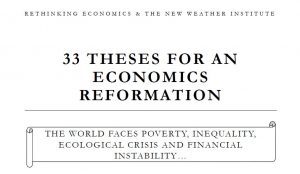Marking the 500th anniversary of Martin Luther’s challenge to the established church, the New Weather Institute and campaign group Rethinking Economics, with input from a wide range of economists, academics and concerned citizens, challenged the mainstream teaching of economics and published a call for change in 33 Theses for an Economics Reformation. The call featured in The Guardian and was supported by over 60 leading academics and policy experts (see updated list below).
Five hundred years ago in Europe, a single belief system dominated all public discourse: Catholic Christianity. Those held to be experts in this set of beliefs held immense power, since it enabled them to claim unique authority in all matters – from the rules of behaviour, to the right to rule. Kings and Queens listened to their advice, and feared their criticism. Intellectuals submitted to the confines of their ideology, as to break free from it took exceptional imagination and courage. Ordinary people may have had misgivings, but the priests protected their theories by speaking in a language that the public could not understand, concealing any contradictory evidence.
There is now a similar situation in Neoclassical economics. It has developed as a belief system does, deriving all its theories from some founding principles which themselves pass unquestioned. It’s come to dominate public debate and decision-making; and its proponents claim special authority to pronounce on all matters – from money and savings to migration and sovereignty. Its teaching has taken on the characteristics of indoctrination: students are asked to memorise and repeat rather than to criticise and evaluate. Those who dispute its fundamental theories are ignored or marginalised. Its apparently sophisticated mathematical language presents to the public a veneer of expertise, while obscuring value judgements, guesswork and uncertainty which is, at times, as unworldly as any belief system based on faith.
Five hundred years ago, Martin Luther broke the grip of the monopolistic belief system of his time, with ’95 theses’ setting out its faults clearly in the common language, making them plain for all to see, and proposing the beginnings of a new way forward. We propose a new 33 Theses for an Economics Reformation.
Here’s what people well-placed to comment on the problems with mainstream economics say about our call for an Economics Reformation:
“In Economics today, the path to Truth is mediated by its priesthood. Economics Reformation, in its Theses nailed to the door of LSE, argues that students should read the scriptures, in all their great variety, for themselves. Thus they will learn that the Pope (formerly Samuelson, now Mankiw) is not infallible and that they must search for Truth in the contest of ideas.” Victoria Chick, Emeritus Professor of Economics, University College London
“Economics needs a Copernican Revolution, let alone a Reformation. Equilibrium thinking in Economics should go the way of Ptolemaic Epicycles in Astronomy.” Professor Steve Keen, School of Social and Behavioural Sciences, Kingston University London
“The opportunity and the vital necessity to rethink economic models is stimulated by a group of recent manifest failures. The major threat of climate change and ecological destruction. The financial debt crisis of 2007/8. The growing difference between income levels of the poorest and the richest in our societies. Media control by a small number of extremely wealthy individuals. In this context the ’33 Theses’ document is a stimulant to action, and very much to be welcomed.” Sir David King, FRS, Government Chief Scientific Advisor, 2000-2007
“Rethinking Economics and the New Weather Institute are absolutely right to say that a better economics isn’t just possible, but essential. For too long now the political mainstream has worshipped at the altar of neoliberal economics, as if it’s the only way of doing things. Such a blinkered approach is clearly wrong, and it’s brilliant Rethinking Economics and the New Weather Institute are widening the debate and bringing in fresh ideas.” Caroline Lucas MP, Co-Leader of the Green Party
“Neoclassical economics plays the same role as Catholic theology did in Medieval Europe – a system of thought arguing that things are what they are because they have to be. Like the Reformation 500 years ago, the young economists of Rethinking Economics are challenging the intellectual monopoly, calling for a more pluralistic and inter-disciplinary approach to economics. This is an extremely important and timely intervention made at a juncture that may be the last chance to save mainstream economics from itself, and save the world from mainstream economics. Pay attention.” Ha-Joon Chang, Faculty of Economics, University of Cambridge
“We welcome this theses around economic reform, one that must begin in the institutions that educate our future economists. At a time when the world is searching for the answers to the economic, social and environmental challenges of our generation, we must prepare the economics students of today for the world of tomorrow.” Rowan Mataram, campaigns coordinator, Rethinking Economics
“For all the bluster and tenacity of the economics mainstream, the writing has long been on the wall for its dogmatic doctrine, and it’s time to nail new theses to its door. Neoclassical economics can neither account for the world as it is, nor produce a programme capable of addressing the epochal challenges of social inequality, economic instability and climatic upheaval. This is our call for a new realism in economics, one that engages with real people, real markets and the real world on whose ecosystems we depend, not, at best, their unrecognisable mathematical abstractions.” Andrew Simms, New Weather Institute, research associate, Centre for Global Political Economy, University of Sussex
“Today’s economics students face a deep irony. On committing to spend years of their lives and a great deal of money studying the subject, the first thing they discover is that they must rewrite the syllabus to make it fit for the challenges they know lie ahead. Yes, economics is in crisis and the last thing it needs is creeping reform: it’s time for a sweeping reformation. Listen to the students: they are the future of economics and its best chance of becoming relevant again.” Kate Raworth, Environmental Change Institute, Oxford University
“Amid growing inequalities, economic insecurity and a world over-shooting planetary boundaries, we need an economics that is able to explain and address these realities. It is now crystal clear that conventional neoclassical economics fails on both counts. The time for an economic reformation is now. This intervention is timely and critical.” Peter Newell, Professor of International Relations, University of Sussex
The launch of the Theses was held at University College London and done in association with the Economists Society of University College London and the Institute for Innovation and Public Purpose. The whole debate can be viewed here: the Economics Reformation debate.
Signatories of the letter of support for an Economics Reformation:
- Professor Stephany Griffith-Jones, Financial Markets Director, Columbia University
- Frances Stewart, Professor Emeritus, University of Oxford
- Jayati Ghosh, Professor of Economics, Jawaharlal Nehru University, New Delhi, India
- Steve Keen, Professor of Economics, author Debunking Economics
- Victoria Chick, Emeritus Professor of Economics, University College London
- Prof Danny Dorling, Oxford University
- Dr Ha-Joon Chang, Reader in Economics, University of Cambridge
- Ian Gough, Visiting Professor, London School of Economics
- Professor Eric Beinhocker, Executive Director, Institute for New Economic Thinking, Oxford Martin School
- Professor Doyne Farmer, Director of Complexity Economics, Institute for New Economic Thinking, Oxford Martin School
- Kate E Pickett, Professor of Epidemiology, University of York
- Tim Jackson, Professor of Sustainable Development, University of Surrey
- Kate Raworth, Environmental Change Institute, Oxford University
- Richard Wilkinson, Emeritus Professor of Social Epidemiology, University of Nottingham
- Professor Adam David Morton, Department of Political Economy, University of Sydney
- Peter Newell, Professor of International Relations, University of Sussex
- Mario Seccareccia, Professor of Economics, University of Ottawa
- Mehmet Ugur, Professor of Economics and Institutions, University of Greenwich
- Richard Murphy, Professor of international political economy, City, University of London
- Alan Cibils, Pofessor of Political Economy, Universidad Nacional de General Sarmiento, Argentina.
- Sir David King, Government Chief Scientific Advisor, 2000-2007, Emeritus Professor, University of Cambridge
- Professor Rebecca Malby, London South Bank University
- Mike Danson, Professor of Enterprise Policy, Heriot-Watt University
- Prof Tim Lang, City, University of London
- Prof Christine Cooper, University of Strathclyde
- Bill McGuire. Professor Emeritus of Geophysical & Climate Hazards, University College London
- Cyrus Bina, Distinguished Research Professor of Economics, University of Minnesota
- Marc Lavoie, Senior Research Chair, Université Sorbonne Paris Cité, Emeritus Professor, Department of Economics, University of Ottawa
- Louis Philippe Rochon, Full Professor, Economics, Laurentian University
- Professor Alfredo Saad Filho, Department of Development Studies, SOAS, University of London
- Professor Lyla Mehta, Institute of Development Studies, UK
- Pritam Singh, Professor of Economics, Oxford Brookes Business School
- John Weeks, Professor Emeritus of Economics, SOAS, University of London
- Professor Rhys Jenkins, School of International Development, University of East Anglia
- Professor Aled Jones, Global Sustainability Institute, Anglia Ruskin University
- Professor Howard Stein, Department of Epidemiology, University of Michigan
- Michael Lipton, Emeritus Professor, Economics, Sussex University
- Professor Emeritus Geoffrey C Harcourt, Adelaide, Emeritus Reader in the History of Economic Theory, Cambridge
- Peter Taylor-Gooby, Professor of Social Policy, University of Kent
- Andrew Simms, New Weather Institute, Research Associate, University of Sussex
- Tony Greenham, Director of Economics, Royal Society of Arts, Manufactures and Commerce.
- Victor Anderson, Visiting Professor, Global Sustainability Institute, Anglia Ruskin University
- Philip Daniel, Honorary Professor, University of Dundee
- Judith Heyer, Emeritus Fellow, Economics, Somerville College, Oxford
- Dr Suzanne J Konzelmann, Reader in Management, Birkbeck, University of London, Co-Executive Editor, Cambridge Journal of Economics
- Dr Andrew Denis, Department of Economics, City, University of London
- Dr Steven Hail, School of Economics, University of Adelaide
- Dr Daniela Senkl, University of Strathclyde Business School
- Dr Kalim Siddiqui, The Business School, University of Huddersfield
- Dr Charlie Dannreuther, School of Politics and International Studies, University of Leeds
- Dr Andreas Antoniades, Senior Lecturer in Global Political Economy, University of Sussex
- Dr David Ockwell, University of Sussex
- Dr Josh Ryan-Collins, Institute for Innovation and Public Purpose, University College London
- Dr Michael Joffe, Imperial College London
- Dr Mary M Cleveland, School of International and Public Affairs, Columbia University
- Dr Emanuele Lobina, Public Services International Research Unit, University of Greenwich
- Dr Eugenia Correa, Mexico National University
- Stewart Lansley, Fellow, City, University of London
- Gareth Dale, Brunel University
- Lynsey Hanley, Lancaster University
- Neal Lawson, Chair of Compass
- Ann Pettifor, Director, Prime Economics
- AnnaCoote, Principal Fellow, New Economics Foundation
- Dr Mark S. Freeland, (retired) Centers for Medicare & Medicaid Services, U. S. Department of Health & Human Services
- Jennifer Castañeda-Navarrete, Institute of Development Studies, UK
- Tim Crabtree, Senior Lecturer in Economics, Schumacher College
- Mariano Arana, Instituto de Industria, Universidad Nacional de General Sarmiento
- Alan Freeman, Geopolitical Economy Research Group
- Will Straw (personal capacity)













